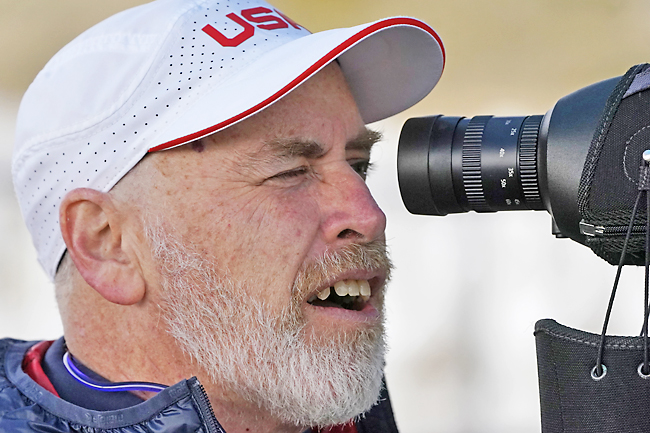Martha Bellisle
MIDWAY, UTAH (AP) – Sean McCann peered at the targets through a spotting scope and used a hand-held magnetic board to mark where the bullets hit. He showed the results to the athlete as they left the range and then grabbed a broom to sweep shell casings off the mat before the next skier arrived.
To a casual observer, McCann appeared to be a United States (US) biathlon coach helping his team get ready for the Olympic trials race earlier this season at the Soldier Hollow Nordic Center.
But McCann’s not a coach.
He’s a clinical psychologist who works for the US Olympic and Paralympic Committee – one of seven assigned to various teams. At certain times of the year, he is “embedded” with the US biathlon team to help them perform at their best.
He lives, trains and travels with the athletes and coaches, interacting with them like a friend.
“In psychology, in particular, sports psychology, those relationships of trust are really important,” McCann said.

“Part of our job is taking care of the whole person, not just the athlete, because you can’t leave the person at the door.”
He may seem casual, but his presence is serous business.
“Being an elite athlete, being an Olympic athlete is very stressful,” he explained. “You’re constantly measured, constantly challenged. You’re constantly under some sort of environmental stress, so what we do in sports psychology is stress management.”
The issue of mental health in sports became part of the national conversation last year after tennis star Naomi Osaka revealed her bouts with depression.
The discussion was amplified when US superstar gymnast Simone Biles withdrew from competition at the Tokyo Olympics, choosing her own health and well-being over the demands to perform.
Biles’ courage prompted Michael Phelps, the most decorated Olympian in history and an athlete who has been up front about his mental health struggles, to proclaim “it’s okay to not be okay.”
“It was a public education,” McCann said of those mental health revelations. It was helpful for the athletes but also important for the public to hear those messages: Have more compassion and empathy with what the athletes are going through.
Head coach for the US cross country ski team Matt Whitcomb said every athlete works with a sports psychologist. While travelling, they also receive help from their home club coach, national team staff, physical therapists and massage therapists – a whole support network.
US cross country skier Jessie Diggins literally wrote a book on the struggles female athletes face as they try to stay fit while dealing with unrealistic pressures to have a certain body type. Skinny isn’t healthy, she said in her book Brave Enough about her journey to recover from bulimia.
Diggins has worked with a sports psychologist since she was 19, she said, and she’s glad more people feel comfortable talking about it.







